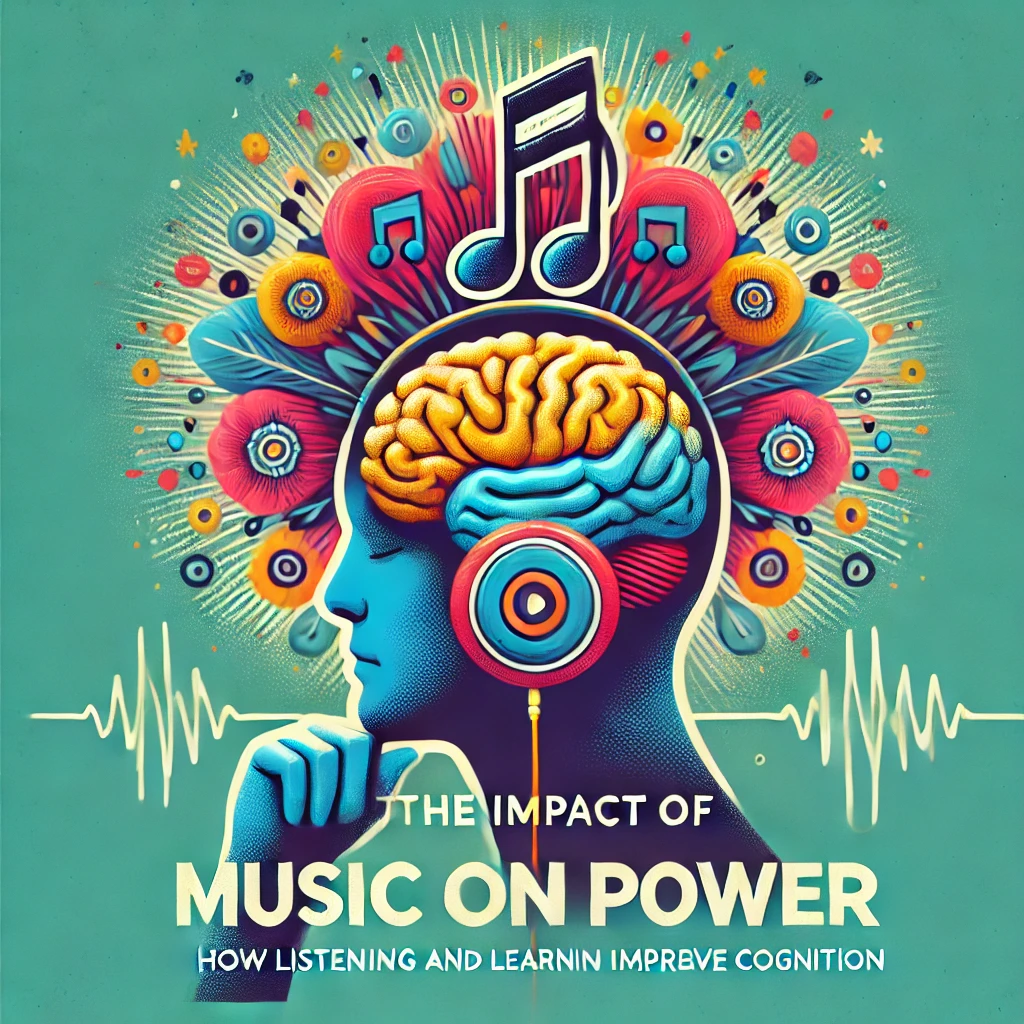Introduction
For centuries, music has been a universal language, bringing people together, lifting spirits, and evoking emotions. But did you know that music also has a profound impact on your brain? Research shows that listening to music—and even more so, learning to play it—can enhance cognition, improve memory, and boost brain power in surprising ways. From classical compositions to your favorite pop tunes, music is more than just entertainment; it’s a powerful tool for mental health and cognitive function.
In this article, we’ll dive into the science behind the connection between music and brain power benefits, explore how music improves cognition, and share practical tips on incorporating music into your life for better mental clarity and focus. Whether you’re a lifelong music lover or new to its benefits, you’ll discover why and how music can become a valuable part of your cognitive wellness journey.
1. The Science Behind Music and Brain Health
Understanding the effects of music on brain health begins with neuroscience. Listening to music activates multiple areas of the brain, including those responsible for memory, emotion, and even movement. When we listen to music, our brains release dopamine, a chemical associated with pleasure and motivation. This release of dopamine can enhance focus, mood, and even help in stress management.
How music improves cognition:
- Stimulates brain regions: Music activates the hippocampus (memory), amygdala (emotion), and prefrontal cortex (decision-making).
- Encourages neuroplasticity: Neuroplasticity is the brain’s ability to form and reorganize connections, which music enhances, helping the brain remain adaptable.
- Increases dopamine: Music can naturally boost dopamine, improving mood and motivation.
Relatable anecdote:
I used to listen to classical music while studying for exams in college. I found it helped me concentrate, almost like it was training my brain to focus. The melodies kept me calm, and when I looked back at my notes, I retained the information better. It became my go-to study tool, one that I still use today when I need to focus!
2. The Cognitive Benefits of Listening to Music
Listening to music offers immediate benefits for cognition, even if you’re not actively playing an instrument. Many studies indicate that music can improve memory, attention, and mental clarity, making it easier to stay productive and focused.
Brain benefits of listening to music:
- Enhances memory retention: Music helps link information to specific sounds or rhythms, which can improve recall.
- Boosts attention and focus: Certain genres of music, particularly classical and ambient music, can help the brain maintain focus for extended periods.
- Reduces mental fatigue: Music’s soothing effects can reduce the perception of fatigue, making it easier to work on mentally demanding tasks.
Example:
One of my friends who works in a high-pressure job plays ambient music in the background to stay focused. He swears by it, saying it helps him tune out distractions and concentrate on his work without feeling overwhelmed.
Tips for using music to boost cognitive function:
- Choose music without lyrics if you’re trying to concentrate on a task that requires deep thinking.
- Experiment with different genres, like classical or ambient, to see what best supports your focus.
- Keep the volume at a moderate level; music that’s too loud can become a distraction.
3. Learning Music for Improved Brain Power
Learning to play an instrument provides even greater cognitive benefits than listening alone. When you learn an instrument, you engage both hemispheres of the brain, creating connections that improve memory, enhance problem-solving skills, and boost overall mental clarity.
Cognitive benefits of learning music:
- Strengthens memory and recall: Learning music requires memorizing notes, scales, and rhythms, which strengthens both short-term and long-term memory.
- Enhances hand-eye coordination: Playing an instrument develops motor skills, particularly hand-eye coordination, which can improve reaction time and cognitive agility.
- Improves problem-solving abilities: Music requires constant adjustment and attention, training the brain to think creatively and solve problems.
Relatable anecdote:
I started learning to play the guitar last year, and the experience has been unexpectedly transformative. At first, it was frustrating, but with practice, I noticed that my memory improved, and my mind felt sharper. Now, it’s become my favorite way to unwind and stimulate my brain at the same time.
Tips for getting started with learning music:
- Choose an instrument that interests you, whether it’s guitar, piano, or even the ukulele.
- Start with simple exercises or beginner lessons, gradually building your skill and confidence.
- Aim for short, regular practice sessions to keep your brain engaged without feeling overwhelmed.
4. Using Music to Enhance Memory and Focus
Music isn’t just a mood booster; it’s also a memory enhancer. Listening to familiar music can trigger memories and emotions, while specific genres can support focus and clarity. Classical music, in particular, has been associated with improved spatial reasoning and memory retention.
Music for improved memory and focus:
- Classical music: Often used for studying, classical music can improve concentration and make it easier to retain information.
- Ambient music: Minimalist, repetitive tunes provide background noise without distracting the brain, making it ideal for deep concentration.
- Personal favorites: Music that you enjoy can trigger positive emotions and improve your mental state, which helps memory and focus.
Example:
I always listen to classical piano music when I’m writing or working on a complex project. The gentle, flowing tunes keep me grounded, helping me stay calm and focused for longer periods. It’s like my brain clicks into “focus mode” as soon as the music starts playing.
5. How Music Reduces Stress and Anxiety
Stress and anxiety are major barriers to cognitive function, and music can play a powerful role in reducing both. Listening to calming music can lower cortisol levels (the stress hormone), helping your mind stay clear and relaxed. This reduction in stress is crucial for cognitive health, as chronic stress is known to impair memory, focus, and decision-making.
How music impacts brain performance by reducing stress:
- Reduces cortisol: Listening to calming music can lower cortisol, allowing the brain to focus on tasks without stress interference.
- Promotes relaxation: Music encourages the release of endorphins, creating a sense of well-being and mental clarity.
- Improves sleep quality: Many people find that listening to music before bed improves sleep, which is essential for memory and focus.
Relatable anecdote:
After a particularly stressful week, I tried listening to calming nature sounds with gentle piano music before bed. It helped me unwind and sleep better, and I woke up feeling more refreshed and mentally sharp the next day. Now, it’s a part of my evening routine.
How to use music for stress relief:
- Listen to soothing genres, like classical or lo-fi, when you’re feeling anxious or overwhelmed.
- Create a calming playlist to play before bed to help improve sleep quality.
- Use noise-canceling headphones to immerse yourself fully in the music, allowing you to focus on relaxation.
6. Enhancing Creativity Through Music
Creativity and music are closely linked, as music stimulates brain areas responsible for creative thinking. Listening to or creating music can help the brain generate new ideas, think outside the box, and overcome mental blocks.
How music enhances creativity:
- Activates the prefrontal cortex: This brain region is responsible for creative thinking, and music can help stimulate it.
- Encourages flow state: Music can help you enter a “flow state,” where you’re fully immersed in a task, allowing creativity to flourish.
- Reduces mental barriers: Music can reduce overthinking and perfectionism, which often stifle creativity, allowing ideas to flow more freely.
Example:
When I’m working on a creative project, I often play jazz music. The unpredictability and flow of jazz seem to put my mind in a state where ideas come naturally, and I feel less inclined to censor or second-guess myself.
Tips for using music to boost creativity:
- Listen to genres with complex rhythms, like jazz or classical, as these can stimulate creative thinking.
- Create a specific playlist for creative work to signal to your brain that it’s time to enter “creative mode.”
- Experiment with different tempos and styles to find what helps spark ideas.
7. Practical Tips for Incorporating Music into Your Daily Routine
Whether you’re looking to improve focus, boost memory, or reduce stress, there are plenty of ways to incorporate music into your day-to-day life to enjoy its cognitive benefits.
Ways to use music for mental clarity and focus:
- Morning playlist: Start your day with energizing music to wake up your brain and set a positive tone.
- Work or study music: Choose instrumental music for tasks that require concentration and memory retention.
- Break time tunes: Use upbeat or fun songs during breaks to lift your mood and recharge your focus.
- Evening relaxation: Wind down with soothing music to signal your brain that it’s time to relax and prepare for sleep.
Relatable anecdote:
I created a few different playlists for my daily routine: one for focusing, one for working out, and another for unwinding in the evening. Each playlist helps me get into the right mindset, making it easier to transition between tasks and stay mentally sharp throughout the day.
8. Using Music as a Tool for Lifelong Cognitive Health
The benefits of music for brain health extend well beyond focus and memory. Regular engagement with music, especially as we age, can help maintain cognitive function, reduce the
risk of dementia, and improve overall mental well-being. Learning to play an instrument or participating in musical activities can be a rewarding way to keep your brain healthy over the long term.
Long-term cognitive benefits of music:
- Protects against cognitive decline: Studies show that musical training and listening to music can slow age-related cognitive decline.
- Improves quality of life: Music supports emotional health, which is crucial for cognitive function and overall mental clarity.
- Supports social connections: Playing or listening to music with others fosters social interactions, which are known to protect against cognitive decline.
Example:
My grandmother, who has always loved playing the piano, still plays regularly in her 80s. She says it keeps her mind sharp and helps her stay connected to her friends who share her love of music. It’s a beautiful reminder of the lifelong power of music for mental clarity and joy.
Conclusion
From enhancing memory and focus to reducing stress and sparking creativity, music’s impact on brain power is truly remarkable. Whether you’re listening to your favorite songs, using instrumental tracks for concentration, or picking up an instrument yourself, music offers numerous cognitive benefits that can improve both your mental performance and quality of life.
By incorporating music into your daily routine, you can harness these benefits and support your brain health in meaningful ways. So the next time you feel stuck, stressed, or just in need of a mental boost, turn on some music and let the power of sound elevate your mind.
FAQ Section
1. How does music benefit brain health?
Music activates multiple areas of the brain, stimulating memory, focus, and emotional regulation, which support overall cognitive health.
2. Can music improve memory and concentration?
Yes, music can enhance memory retention, reduce mental fatigue, and improve concentration, especially when listening to instrumental or classical music.
3. Does learning an instrument help brain power?
Learning an instrument strengthens memory, improves hand-eye coordination, and enhances problem-solving abilities, all of which benefit cognitive health.
4. What types of music are best for focus?
Instrumental genres like classical, ambient, or jazz are generally effective for concentration, as they lack distracting lyrics.
5. Can music reduce stress?
Yes, listening to calming music can lower cortisol levels, helping reduce stress and improve mental clarity.
6. Does music increase creativity?
Music stimulates the brain’s creative areas, reducing mental blocks and helping people think outside the box, especially with complex genres like jazz.
7. Is there a connection between music and cognitive decline?
Studies suggest that regular musical engagement can protect against cognitive decline, supporting memory and mental clarity as we age.
8. How does music impact emotions and mental clarity?
Music can release dopamine, a neurotransmitter associated with pleasure, which boosts mood and enhances mental clarity.
9. Can listening to music help with sleep?
Yes, calming music before bed can improve sleep quality, which is essential for memory retention and focus the next day.



